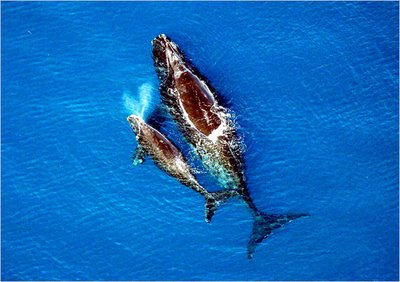
This here is one of them there good news/bad news/good news stories.
Now when I was a little tyke in green tights, long before I had conceived of the majestic literary masterpiece that is the Thin Green Line, I had a thing about whales.
It began when I was a lad at Copper Beech Middle School in the Lakeland School District of Westchester County, NY.
There, a super-cool music teacher whose name is now sadly lost in the rusted steel trap of my mind, introduced the close-packed class (music was taught in closets even back then) to the contemporary music of Gordon Lightfoot.
What captured my imagination was a song titled "Ode to Big Blue" which was about the Blue Whale. I was hooked at the first hearing.
For a brief and moderatly embarassing time, I thought I was hooked on Gordon Lightfoot, which led to many unfortunate hours for my family while I blasted greedily purchased Gordon Lightfoot albums in an attempt to re-capture the feeling of that first listen.
After a time, I came to realize the feeling came from a sense of wonder about whales, and not from Lightfoot's monotone singing style (although I still remember all the words to "Second Cup of Coffee" and the unfortunate hit, "Wreck of the Edmund Fitzgerald.")
What followed was a period in my "tweens" and early adolesence during which I dedicated myself to whatever I could learn about whales. I learned a lot and tore photographs from articles about whales in National Geographic and glued them to incredibly heavy pieces of plywood I found around the house. These I hung on my walls using nails larger than some whale bones you might find.
(When my mother sold our house, I'm sure the hundreds of holes in the honeycombed walls of my room brought the price of the house down significantly.)
I decided I would be a marine biologist, combining my love of the ocean with my interest in cetaceans. (See, I was learning all sorts of scientific words and stuff).
Unfortunately, science turned out to require an understanding of math, a subject about which I had developed a phobia thanks to the public humiliation teaching style of a less-cool teacher in the Lakeland School District. (Her name I remember clearly, but I will spare her -- if she's still alive -- the shame with which she sought to motivate me.)
Regardless, I realized poor math skills would make my career as a scientist woefully lacking in accurate data.
Then I decided I would be an "international lawyer" dedicated to the preservation of the species in the world's courts of law, fighting the lonely fight to save creatures who would never know my name or touch. Damn noble of me don't you think?
Although I confess to being a halfway decent arguer, this ambition too fell by the wayside, probably because of how much work it threatened to require. (Noble, but lazy, the perfect description of my teen years.)
Then, having gently rejected my mother's fondest wish that I become a park ranger, I pursued her worst nightmare and became a writer, like my father, doomed to a life of flying fancies, past participles and empty bank accounts.
All of which is a long-winded way of saying that throughout it all, I never lost my interest in whales, an interest which has been tickled by recent events.
The first was
this article in The New York Times, which reports that conservation and protection efforts actually worked and this slow-moving cetacean is on the rebound.
"North Atlantic right whales, which can grow up to 55 feet long and weigh up to 70 tons, were the 'right' whales for 18th- and 19th-century whalers because they are rich in oil and baleen, move slowly, keep close to shore and float when they die," the Times sumarized: all terrible characteristics for a species trying to survive its initial contact with mankind. It was "right" for us, not them.
By 1900, it was estimated that as few as 100 remained, literally hunted to extinction, the dodo of the seas.
But recently, the good news came fast and furious, as the Times outlined:
- Recent changes in shipping lanes, some compulsory and others voluntary, seem to be reducing collisions between whales and vessels.
- The Bush administration agreed last year to lower speed limits for large vessels in coastal waters where right whales congregate. (Yes, Bush deserves credit. You heard it here first!)
- Fishing authorities in the United States are beginning to impose gear restrictions designed to reduce the chances whales and other marine mammals will be entangled in fishing lines. Canada is considering similar steps.
- In December, researchers from the National Oceanic and Atmospheric Administration spotted an unusually large aggregation of right whales in the Gulf of Maine. A month later, a right whale turned up in the Azores, a first since the early 20th century.
- And last year, probably for the first time since the 1600s, not one North Atlantic right whale died at human hands.
We shouldn't be surprised that it took so long. The Right Whale does everything slowly: slow swimmer, slow breeder; slow to make a comeback.
All of which is part of what so fascinated me as a kid. They are so different from us and, quite possibly, smarter than us (something which a regular reading of The Mercury's Sound Off column quickly convinces me is easily achieved).
The ratio of the size of a cetacean's brain, in relation to its spinal cord -- one way scientists measure a species' intelligence -- is actually greater than mankind's. They are evolved from creatures who went back to the sea after living on land for a time. And their slow grace underwater is a wonder to behold.
And no sound more perfectly captures the spirit of the ocean itself, than the mournful mysterious sound of whale calls underwater.
But before I could go down to the basement and dig up my old Gordon Lightfoot records, I made the mistake of reading The Mercury.
There I found
this article from the Associated Press, about how the world's financial crisis had had an unexpected victim -- a program that monitored these very creatures just as their comeback so desperately needs to be documented.
The monitoring program, which tracked whales as they passed New York Harbor on their way to their New England feeding grounds, is run by Cornell University and it quite simply ran out of money.
If you want to know more, click
here.
(Geek Alert!: And no, the above link does not bring you to a Web site for Star Trek IV! Fellow geeks will get this joke.)
I am realist enough to know that as we fend off a Depression, making a pitch for more public money to monitor whales is unlikely to make it to the top of the priority list.
But rather than lure me into despair, the universe conspired to provide a dollop of hope, in the most unlikely of places -- a Pottstown School Board meeting.
As it does every month, the meeting began with the winners of the writing awards reading their work, and this month's readers were from Barth Elementary School.
I did not hear them all, arriving late as usual, but I did arrive in time to hear a composition by a young man whose name I did not catch at the time and have not yet discovered. (I will however.)
His essay was about how important it is to protect Humpback Whales and laid out all the reasons, not the least of which is how little we know about them.
I realized another generation is picking up the torch and this time, might succeed in becoming a scientist, an expert rather than just an enthusiast.
I wonder if he would be interested in my Gordon Lightfoot collection....
This is the essay written by the Barth student, Carlos Fuentes-Brown, seen at left reading his essay:

 RSS
RSS








